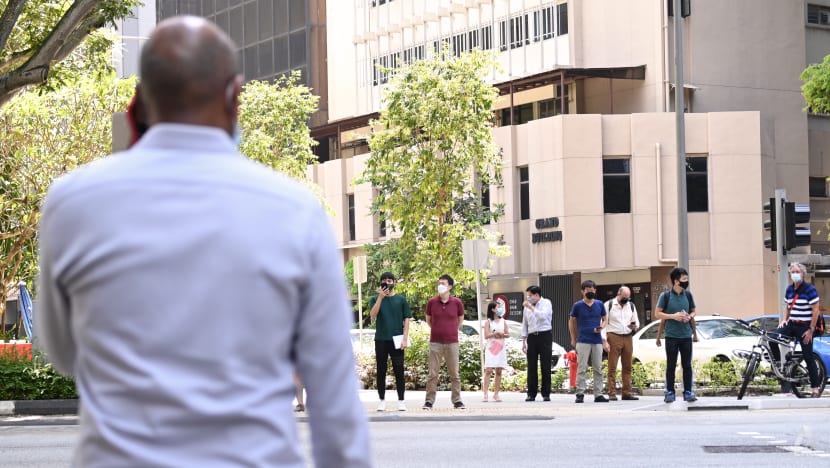SkillsFuture Singapore has contacted all parties to recover S$4.22 million in grant overpayments: MOE

People wearing protective face masks waiting to cross the road at Church Street on Sep 6, 2021. (Photo: CNA/Gaya Chandramohan)
SINGAPORE: SkillsFuture Singapore (SSG) has contacted all affected training providers, companies and individuals to recover the millions in overpayments made due to lapses in the management of its grants, said Minister of State for Education Gan Siow Huang on Monday (Aug 1).
These parties “will be given time to check their own records and return any confirmed overpayment”, she told Parliament.
An annual report by the Auditor-General’s Office (AGO), released last month, found that SSG had overpaid an estimated S$4.22 million to grant applicants and training providers.
This was caused by inaccurate or erroneous declarations by grant applicants and training providers that were not picked up by the agency’s internal checks, said Ms Gan in a reply to questions from Members of Parliament.
A majority of these errors occurred prior to November 2020 when SSG’s previous IT system for grant administration had used a declaration-based approach, she added.
Other errors also occurred during the manual processing of grants, including human errors made by the service provider contracted by SSG to perform grant administration functions.
Ms Gan said that to reduce reliance on declarations and manual processing, the agency had since November 2020 put in place a new IT system that uses administrative data in government databases to determine and verify eligibility of the grant applicants.
SSG is also streamlining its business rules to rely less on declared information and manual verification.
“Where these cannot be avoided, SSG will tighten its audits on payments disbursed and on the work of its service provider,” Ms Gan added.
SSG, the agency in charge of lifelong learning, was also found by the AGO to be lax in enforcing the collection of Skills Development Levy (SDL) funds from 2015 to 2020, resulting in an estimated S$43 million owed to the agency as of April this year.
The SDL is a compulsory levy that companies have to pay each month for all their employees working in Singapore.
The levy payable for each employee is 0.25 per cent of the monthly total wages. The agency derives estimates of SDL payable by firms based on existing government data, such as the Central Provident Fund (CPF).
“SSG’s estimates may differ from actual SDL amounts paid by employers due to factors such as fluctuations in total wages paid to foreign workers every month,” said Ms Gan.
“In some cases, the variance may be due to employers using more updated employee data, instead of being an actual underpayment of SDL.”
SSG has adopted a “risk-based approach” to follow up on estimated variances, she added.
“The overall variance between the estimated SDL payable and the actual payments has fallen from 18 per cent of overall SDL collected in 2008, to the current 3 to 4 per cent, with the majority of companies compliant in paying their levy today.”
Ms Gan attributed this to IT system improvements and SSG’s reminder letters and calls, but the agency acknowledges that more needs to be done to actively reconcile remaining gaps and help all employers pay the correct levy.
SSG will give affected employers time to validate the amount owed, she said, adding that the agency has started engaging affected employers and will contact all by the end of this financial year.
Ms Gan also said timely payment reminders will be sent, while more efficient processes will be developed to resolve differences in the company’s and SSG’s estimates of SDL payable.
For the few recalcitrant employers who do not pay the outstanding levies despite reminders, SSG will take “decisive punitive actions”. Individuals will also be taken to task should any negligence be found.
Ms Gan noted that SSG takes the AGO’s findings “seriously” and “will do even more to review and enhance its policies, processes and systems to minimise such lapses”.












